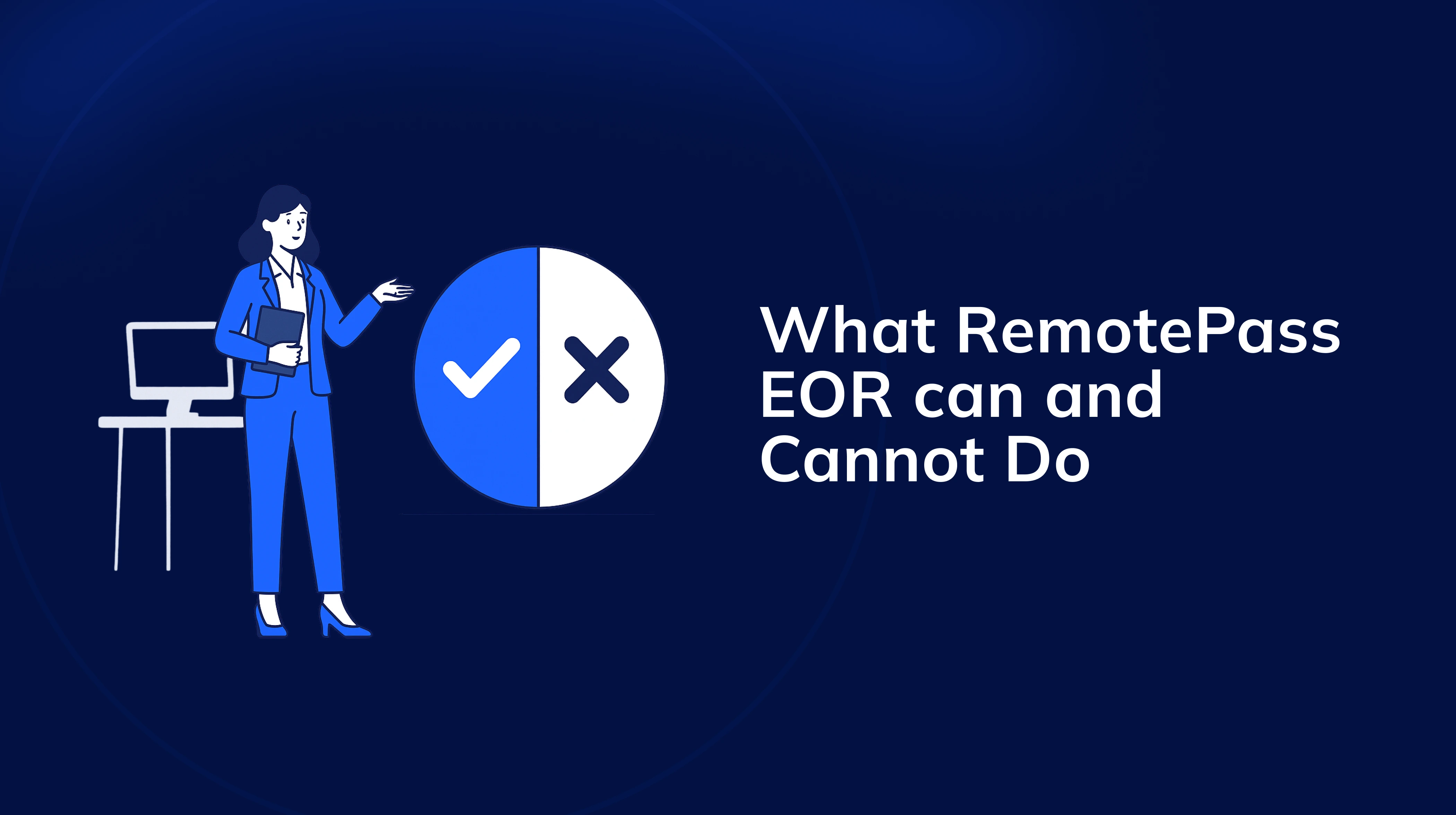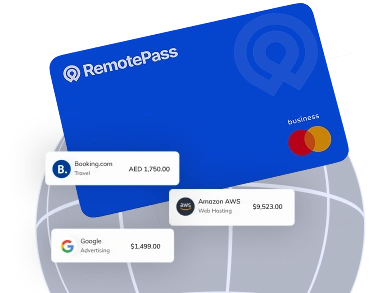Employer of Record (EOR) platforms like RemotePass handle the legal, financial, and compliance side of global hiring. That includes drafting local employment contracts, managing payroll and taxes, providing statutory benefits, and handling onboarding and offboarding.
Because EORs cover so much, many teams assume they also handle recruiting or applicant tracking. They don’t, and that misunderstanding creates problems. It slows down hiring, frustrates teams during onboarding, and risks damaging trust before a single contract is signed.
This guide closes that gap. It gives HR, finance, and operations leaders a clear explanation of what EORs actually do, what they don’t, and what tools or partners you’ll need to fill in the rest.
If you’re planning to hire internationally, this article will help you move faster, set realistic expectations, and avoid costly missteps.
Core EOR Services: What You Can Rely on RemotePass to Handle
Below is a breakdown of what RemotePass covers as part of its core EOR offering:
✅ Employment Relationship & Legal Employer Status
RemotePass becomes the official legal employer in the worker’s country. We take on employer liability, register with the necessary authorities, and ensure the worker is legally hired under local laws.
Example: You hire a product designer in Egypt. You manage the work; RemotePass helps sign the employment contract and becomes the legal employer of record.
✅ Payroll Processing & Statutory Taxes
We calculate gross-to-net salaries, apply statutory deductions, withhold the right taxes, and file the necessary returns with local authorities. Our payroll engine is “local-first”, not a generic global overlay.
Example: Your engineer in the UAE gets paid in AED, with end-of-service benefits calculated correctly under UAE labor law.
✅ Benefits Administration
RemotePass provides access to country-specific statutory benefits and supports additional perks like private insurance or stipends where relevant. We also ensure benefits are compliant with the local employment contract.
Example: A team member in Saudi Arabia gets access to mandatory GOSI coverage, plus optional health insurance as part of your RemotePass plan.
✅ Labor Compliance & Contracts
We handle the drafting, localization, and enforcement of employment contracts. This includes right-to-work checks, probation terms, leave entitlements, and mandatory policies under labor law.
Example: A sales hire in the DIFC free zone signs a DIFC-compliant contract, structured around working days rather than calendar days automatically managed through our platform.
✅ Local HR Admin & Employer Liabilities
RemotePass takes care of routine local HR admin that carries legal weight: issuing employment certificates, managing disciplinary procedures, handling terminations, and more.
Example: If your employee in Kenya resigns, we issue the necessary separation paperwork, calculate the final payslip, and comply with local exit procedures.
✅ Onboarding & Offboarding
We collect KYC documents, get tax IDs issued, onboard to local systems (like pension or social funds), and provide seamless offboarding when employment ends.
Example: When you onboard a developer in Pakistan, RemotePass manages KYC, sets up government IDs, and issues a compliant contract all in a few clicks.
What RemotePass EOR Does Not Do
At RemotePass, we stay focused on what we’re great at. Here’s what’s not included in our EOR service and what to use instead.
❌ Talent Sourcing & Recruitment
We don’t find candidates, post jobs, or vet resumes. That’s recruitment, not employment.
Use this instead: Pair your RemotePass EOR setup with a recruiter, hiring platform, or internal sourcing team.
Why: We step in after you’ve made the hire, not before.
❌ Advanced ATS Features or Hiring Workflows
We don’t manage job pipelines, send automated interview emails, or track candidates across hiring stages.
Use this instead: Connect RemotePass with an ATS (Applicant Tracking System) like Greenhouse, Ashby, or Lever.
Why: An ATS helps you find and track talent; while RemotePass ensures those hires are legally employed.
❌ Detailed Time & Productivity Tracking
We don’t log work hours, screenshots, or activity scores. RemotePass isn’t designed to track hourly input.
Use this instead: Tools like Clockify, Hubstaff, or Harvest for hourly contractors or internal billing.
Why: You’ll still get accurate payroll and leave management through RemotePass, but time-tracking should live where it belongs with your productivity tools.
❌ Employer Brand or Strategic Talent Advisory
We don’t shape your Glassdoor profile, EVP (employer value proposition), or referral strategy. That’s a job for your People or Talent teams.
Use this instead: Partner with a talent branding consultant or build out internal capabilities.
Why: RemotePass supports compliant employment, not your identity as an employer.
❌ Payroll-Only or Pure Contractor Payments
If you’re hiring freelancers, consultants, or independent contractors who don’t need employment status, you don’t need our EOR solution.
Use this instead: RemotePass also offers a Contractor of Record (CoR) product designed for these use cases.
Why: CoR skips employment setup and lets you pay contractors quickly and compliantly.
❌ Full-Service HRIS or People Ops Implementation
We don’t manage performance reviews, learning paths, or HR policy creation.
Use this instead: HRIS platforms like HiBob, BambooHR, or Personio.
Why: RemotePass handles local HR admin for compliance, not internal People Ops strategy.
The best teams use RemotePass alongside specialized tools and internal systems to create a lean, scalable, and compliant global workforce.
If you need help figuring out which parts of your stack still need attention, we’re happy to advise during your onboarding or demo. Just ask.
Should You Pick an EOR, a Recruiter, or a Hybrid?
Choosing the right setup depends on the kind of hiring you’re doing. To figure the best one for you, ask these questions:
Key Questions to Ask First
- Do you need someone legally employed in a country where you don’t have an entity?
- Is this hire permanent or long-term (6+ months), or just for a short project?
- Are you hiring one or two people, or building a multi-country team?
- Do you already have candidates lined up, or do you need help finding them?
- Is the role hourly or billable, with strict time-tracking needs?
Your answers determine the right setup. Here are the three most common paths:
Path A: Use an EOR Alone
Best for: Companies that already have the right candidate and want to hire them quickly and legally without setting up a local entity.
- RemotePass acts as the legal employer
- You handle the sourcing and interviewing
- We take care of contracts, payroll, taxes, benefits, and compliance
Outcome: Fast market entry, compliant payroll, and zero legal headaches.
Example:
A SaaS startup finds a great customer support hire in Kenya. They don’t have a Kenyan entity. With RemotePass, they onboard the employee in 48 hours, start payroll in local currency, and stay fully compliant from day one.
Path B: Use an EOR + ATS + Recruiter
Best for: Companies building distributed teams across multiple countries and want to keep their hiring process structured and scalable.
- You use an ATS (like Greenhouse or Ashby) to manage candidate pipelines
- You partner with recruiters or agencies to source talent in unfamiliar markets
- RemotePass handles compliant employment, payroll, and benefits in each country
Outcome: Scale hiring globally while protecting brand, timelines, and legal coverage.
Example:
A Series A company plans to hire 10 engineers across Brazil, Poland, and Egypt. They use a recruiter to find talent, manage hiring steps through Lever, and use RemotePass to employ each hire locally without setting up entities.
Path C: Use Payroll-Only or Contractor Platforms
Best for: Companies hiring short-term freelancers, consultants, or service-based contractors who don’t require employment benefits or contracts.
- You don’t need full employment setup; just payment and compliance
- No labor contracts or benefits; just fast, compliant international payments
- RemotePass offers a Contractor of Record (CoR) product for this use case
Outcome: Pay contractors in 150+ countries with compliant invoicing, tax forms, and optional add-ons (like FX conversion).
Example:
A design agency works with four freelance illustrators across Asia. They use RemotePass’s CoR setup to pay each contractor monthly in local currency, issue tax-compliant invoices, and avoid currency headaches.
Each path is valid, depending on your needs. The mistake most teams make? Assuming one tool can do all three.
RemotePass supports both EOR and CoR models, and integrates smoothly with the tools you already use for recruiting, tracking, and onboarding. If you’re not sure which setup fits, book a call and we’ll walk you through it.
Build the Right Stack with RemotePass EOR at the Center
EOR platforms aren’t meant to replace your entire HR ecosystem. They’re designed to take the legal, financial, and compliance burden of international employment off your plate. That’s it, and that’s a lot.
With RemotePass, you get a rock-solid foundation:
- Legal employer status in 150+ countries
- Accurate, on-time payroll with statutory tax filings
- Locally compliant contracts and mandatory benefits
- Built-in onboarding and offboarding workflows
- Support when you need it, in plain language, not legalese
Switch to RemotePass and get your new hires onboarded compliantly in just a few days.
Frequently Asked Questions About EOR

.svg)







.svg)
























_EasiestToDoBusinessWith_EaseOfDoingBusinessWith%20(1).svg)





.svg)
















